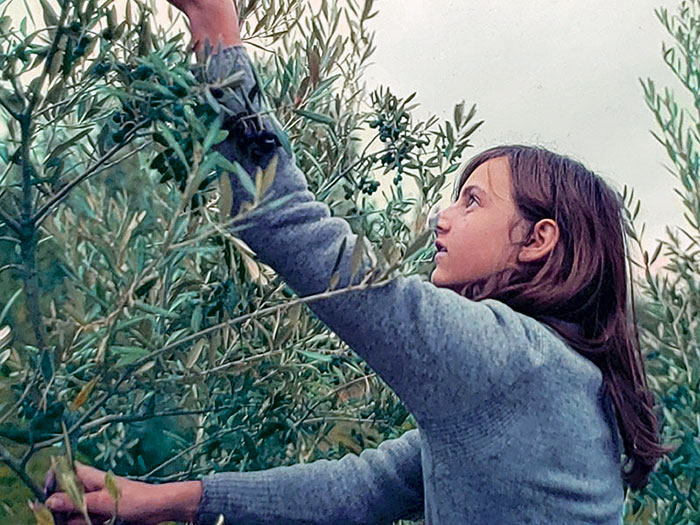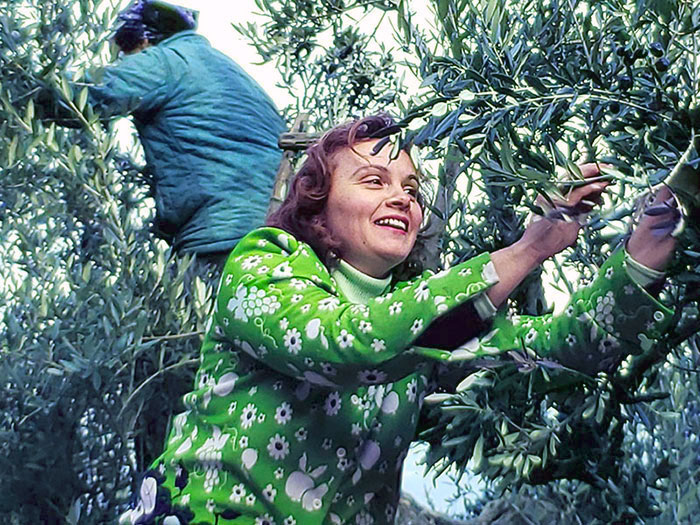HOME | FAMILY | CONDUCTING | SINGING | USU | STEINER | STANFORD | PHOTOS
26th AMENDMENT SIGNING | MEMORIES | YOUTUBE VIDEOS
Picking Olives in Tuscany
(Written in October of 1974 While On Sabbatical in Rome)
We departed Rome heading north to Tuscany (once hailed as the home of the best beef in all the world.) This is also the home of the finest of this world's art treasures, with Michelangelo's David and the many other fine pieces of art in the Uffizi and Pitti galleries. Tuscany is also reputed to be the greatest of all olive groves in the world. I have not attempted to refute the latter since I have only had the experience of observing the olive groves in Tuscany. The daughter of our landlady owned a lovely villa there overlooking the "gem of Europe" Florence and invited us to journey with them for the weekend to assist in the harvesting of their olive crop for 1974. We were delighted to accept her kind invitation and looked forward to a new adventure. We were also anticipating staying in an Italian home and experiencing some home-cooked Italian meals. We were amused that our hosts had requested that Phyllis cook hamburgers for them!
After a lovely three-and-one-half hour drive, we reached our destination, a villa reconstructed from a house that stood on that site some 400 years earlier. To reach the house required a drive up a mountain on a road that is nearly impassable by all except four-wheel-drive vehicles and homemade Italian cars like our Fiat 124 Special. This trip revealed what is "special" about our Fiat -- (1) it has a very difficult time getting up a mountainside, and (2) it only gets (at most) 6 miles to the gallon. This is a significant problem with gasoline selling for $2.50 per gallon! (Modern note: this was A LOT of money for gasoline in 1974! That is equal to about $15.11 per gallon in 2022.)
When we arrived, it was already dusk and we made ourselves, and the house, ready for the night. Kerosene was the fuel that heats each stove in the 12-room house (and only three heaters for the entire villa!) We topped up each stove and began the process of lighting. Two of the stoves started right away, but the third required additional mechanical skills. Ultimately we were successful, and we achieved warmth after waiting several hours required to heat up the ancient icy marble floors and tiled walls.
Early Saturday morning we awoke to begin the job we had come to do - pick the wonderful little olives which each is said to produce about one drop of oil. Our host had hopes of producing about 400 liters of oil this year, so you can calculate how many olives we needed to pick. The olive tree lives more or less forever, (some trees in this particular grove were in excess of 500 years old) but its pickers do not. They fall from ancient crude ladders, and have an olive pop into the larynx while gazing up at the place they know they will never be able to reach. All this caused me to wonder why we didn't offer to help during the grape harvest.

Daughter, Cheri, picking olives in Tuscany

Phyllis picking olives
in Tuscany
The following is excerpted from the International Herald Tribune article in 1974 which matches our experience closely.
The trees are gnarled and twisted and charming but seem to prefer to grow in all directions at once, extending their branches out over steep slopes and sharp rocks. More than 85% of the olive trees in Italy (and all the ones we dealt with) grow on hills and mountains. The old gnarled tree and the old gnarled picker may have much in common.
The wood of the olive tree is beautiful and useful in the fireplace as well as for carving. The tree itself is a charmer, but the pesky olive is defiant, disobedient, bitter, and fiercely determined to stay with its family on the limb. They sulk under leaf clusters and hang from willowy twigs that slip from your hand as you try to gain support from them 30 feet above the ground. The fruit itself is rather small, but you must keep thinking "each olive produces one drop of oil."
For generations, olive farmers plucked the evasive devils one by one with the fingers. Imagine the work of stripping one tree since, at rough calculation, it may bear 786,000 bits of fruit. The process was tedious, to say the least.
(2017 note: Since we had more than 200 trees awaiting us, we employed more modern methods developed through the ages using human ingenuity which sent two men to the moon and back. In those days the art of picking had been automated by using two hands holding the twig with one hand and stripping the fruit by sliding the other down the twig between the fingers. This new method was much faster, but this created leafless and broken branches and there is a price to be paid in bruised and lacerated fingers.)
Before beginning to harvest the olives, we laid a World War II slightly used parachute on the ground, tied at the trunk of the tree and extending outward under the branches. This was used to catch our 786,000 bits of fruit from each tree.
We had a wonderful time watching them bounce, roll, skip, leap, and frequently catapult off the parachute in the fresh Tuscan air. The olive seemed to be angry pellets, which grow just out of reach as you must risk injury or death as you extend your body beyond the normal limits of human endurance above the rocky ground. As the olives are picked, they become angry falling missiles raining down upon balding heads, collecting in cuffs, neckbands, sleeves, shoes, protruding ears, and yes, even in my belly button! I suppose it would have been more efficient to work nude but olives are not a summer crop.
All the work initially seems very rewarding as you proudly gaze up at the harvested tree until you discover that there are several hundred potential drops of oil that are still hanging from the highest branches despite your balancing act and high wire tactics. I now have a better appreciation of why the price of olive oil is on the rise. Nevertheless, people in Italy take a dim view of using Crisco for cooking and salads.
Local farmers refer to red olives as "i communisti" (the Communists) "They are hard to handle, they produce less, and the quality is poor."
While we adults and Cheri spent our time picking olives, our young boys, Chris and David, had a great time searching for wild boars in Tuscany. To my knowledge, they never spotted one. They also were taught how to make gunpowder from saltpetre, charcol, and sulfer.
To say that the Ramsey family had a delightful time would be an understatement. I do know, however, what it feels like to be sore from using muscles that have seldom or never been used before, and it was most rewarding to know that at the age of 37, I could still climb a tree!
